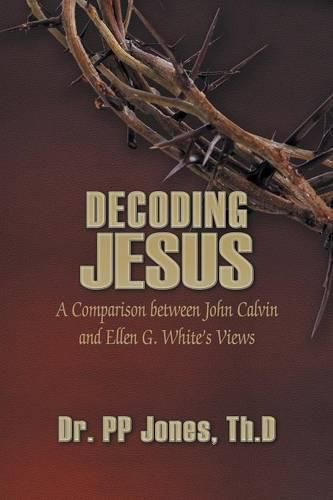Readings Newsletter
Become a Readings Member to make your shopping experience even easier.
Sign in or sign up for free!
You’re not far away from qualifying for FREE standard shipping within Australia
You’ve qualified for FREE standard shipping within Australia
The cart is loading…






This title is printed to order. This book may have been self-published. If so, we cannot guarantee the quality of the content. In the main most books will have gone through the editing process however some may not. We therefore suggest that you be aware of this before ordering this book. If in doubt check either the author or publisher’s details as we are unable to accept any returns unless they are faulty. Please contact us if you have any questions.
Decoding Jesus will forever change your view about Jesus! John Calvin (1509-1564) and Ellen G. White (1827-1915), though divergent in many ways, shared a pivotal common denominator: the Judeo-Christian Bible from Genesis to Revelation as a major template from which they reflected on the close connectedness, and radical difference of God, human beings, and the created environment. Calvin encountered a theological conundrum. He was unaware that one cannot hold on to the 16th-century Reformation of employing the biblical historical time-line from Genesis to Revelation (as a reflexive scheme on God’s four grand acts: creation, reconciliation [the cross/redemption], renewal [Pentecost/Holy Spirit] and fulfillment/end of time), whilst simultaneously embracing the classical first millennium Trinitarian view. Karl Barth, the great Swiss Reformed theologian of the early 20th century, was aware of Calvin’s conundrum. Barth resolved that the dogma of the Trinity is not found in the Bible, but should be used as a good dogma operating as the main starting pattern of one’s theology. How further can one go than Barth in giving the notion of the Trinity a biblical vote of no confidence? White treaded softly around the Trinity notion. Her vast ocean of voluminous writings is devoid of the word Trinity. She visited Switzerland, and having read Calvin’s doctrines, she most likely saw Calvin and the Reformation’s contradiction concerning the dogma of the Trinity, and wanted to avoid the same trap. About the Author Dr. Patrick Patrese Jones, Th.D (Portuguese name: Patricio Jose Figueiredo) is a very successful entrepreneur specializing in property development. He is an international motivational speaker, preacher, teacher, and author, whose academic background includes business, law, philosophy and theology. He lives in White River, Mpumalanga, South Africa. Publisher’s website: http: //sbprabooks.com/PPJones
$9.00 standard shipping within Australia
FREE standard shipping within Australia for orders over $100.00
Express & International shipping calculated at checkout
This title is printed to order. This book may have been self-published. If so, we cannot guarantee the quality of the content. In the main most books will have gone through the editing process however some may not. We therefore suggest that you be aware of this before ordering this book. If in doubt check either the author or publisher’s details as we are unable to accept any returns unless they are faulty. Please contact us if you have any questions.
Decoding Jesus will forever change your view about Jesus! John Calvin (1509-1564) and Ellen G. White (1827-1915), though divergent in many ways, shared a pivotal common denominator: the Judeo-Christian Bible from Genesis to Revelation as a major template from which they reflected on the close connectedness, and radical difference of God, human beings, and the created environment. Calvin encountered a theological conundrum. He was unaware that one cannot hold on to the 16th-century Reformation of employing the biblical historical time-line from Genesis to Revelation (as a reflexive scheme on God’s four grand acts: creation, reconciliation [the cross/redemption], renewal [Pentecost/Holy Spirit] and fulfillment/end of time), whilst simultaneously embracing the classical first millennium Trinitarian view. Karl Barth, the great Swiss Reformed theologian of the early 20th century, was aware of Calvin’s conundrum. Barth resolved that the dogma of the Trinity is not found in the Bible, but should be used as a good dogma operating as the main starting pattern of one’s theology. How further can one go than Barth in giving the notion of the Trinity a biblical vote of no confidence? White treaded softly around the Trinity notion. Her vast ocean of voluminous writings is devoid of the word Trinity. She visited Switzerland, and having read Calvin’s doctrines, she most likely saw Calvin and the Reformation’s contradiction concerning the dogma of the Trinity, and wanted to avoid the same trap. About the Author Dr. Patrick Patrese Jones, Th.D (Portuguese name: Patricio Jose Figueiredo) is a very successful entrepreneur specializing in property development. He is an international motivational speaker, preacher, teacher, and author, whose academic background includes business, law, philosophy and theology. He lives in White River, Mpumalanga, South Africa. Publisher’s website: http: //sbprabooks.com/PPJones